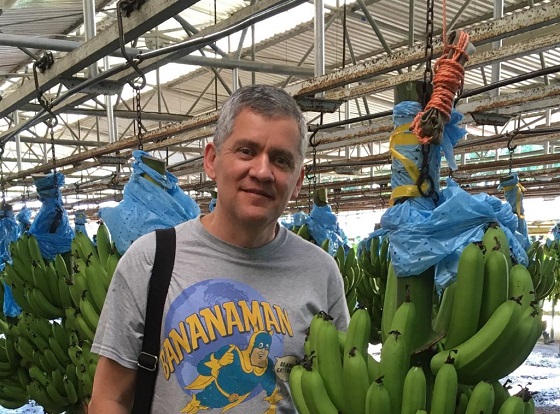A professor at De Montfort University Leicester (DMU) is using research through Artificial Intelligence (AI) to boost banana production in Costa Rica which could help producers save wasted fruit.
Professor David Elizondo, PhD, Professor in Intelligent Transport Systems at DMU’s Department of Computer Technology, has developed a concept that uses AI to deliver cutting methods to reduce fruit waste by producers in the banana industry.
Professor Elizondo and his De Montfort Interdisciplinary Group in Intelligent TranSport (DIGITS) team of mostly volunteers, has developed the OPTIcut technology, which he hopes will soon be ready to be used commercially to help banana growers in South America and elsewhere to make huge savings.
“So far tests of OPTIcut in the field in Central America have shown a reduction in waste levels of between 5% and 10%,” Professor Elizondo said.
“There is a lot of wastage in the banana industry and this technology aims to address that. Bananas are packed in clusters which are limited by the length, width and number of fingers which determine their price. Producers have daily cutting strategies to fulfil specific supermarket orders.
“These strategies are based on previous experience to establish the levels of waste. What we have done is set out to find optimised cutting strategies through technology. OPTIcut uses artificial intelligence to produce optimized cutting strategies based on historical data.”
Professor Elizondo explained that some farms are better suited for a particular type of cut. A typical packing facility process 4,000 bunches a day. Currently producers collect daily fruit data and make critical decisions based on the measurements of 1 to 3 bunches.
“Banana producers have around 15 different hand cuts and most supermarkets have different criteria for the measurement and size of bananas. The bunches of fruit need to meet the supermarkets’ different criteria and if they don’t, this causes wastage.
“To develop optimised cutting strategies, every finger needs to be cut and measured, which is labour intensive and prone to errors. All this fruit is wasted as there is little market for single fingers. We can produce fruit profiles for any type of cut by running OPTIcut with the specific cut measurements.
“With OPTIcut you have a cutting-edge web-based decision support system offering precision agriculture in the banana business.”
The DMU-created technology has been supported by the university and funds from the European Institute of Innovation and Technology (EIT) programme and higher education funding. OPTIcut uses state of the art artificial intelligence and 3D image processing algorithms to provide optimized cutting and fruit profiles tailored to each farm.
“Cutting strategies are currently based on human experience and their number can vary, so there is a clear need to produce data driven optimized cutting strategies which can minimize waste and maximize profit,” Professor Elizondo added.
OPTIcut also offers producers the capacity to estimate the amount of fruit available in every farm, per type of cut and also to record fruit damage to help them make strategic decisions.
Professor Elizondo has dedicated the past six years to intensive research into OPTIcut, working in his spare time alongside his main role of collaborative research and lecturing at the university.
“Initially our research team found it took 36 hours to produce the optmised cutting strategies. Now it takes 10 seconds to run instead of 36 hours. The optimiser has been successfully trialled in Costa Rica by some of the largest banana producers worldwide. But we still need to trial the image processing software.”
To help to raise commercial interest and seek financial backing, Professor Elizondo is going out to Costa Rica, his home country, this month to run trials of OPTIcut at a large farm and to present OPTIcut to other banana farmers and producers.
“We need to promote OPTIcut,” he said. “The image processing in OPTIcut is state of the art and difficult but we are finalising the last part of this process. I am hoping to raise a lot of interest while I am out in Costa Rica.”
Professor Elizondo, who took up his role at DMU in 2003 after working in industry, has been carrying out research in the field of AI for the past thirty years. He said that while he was concentrating on helping to improve food production in Costa Rica, DMU’s new technology could also be used in the production of other fruit in bunches, such as grapes.
“We are also looking at extending the use of OPTIcut for producers in other countries such as Honduras, Spain, India, Philippines, Ecuador and Guatemala,” Professor Elizondo added. “Producers in these countries will be invited to see the field trials in Costa Rica via the internet.”


